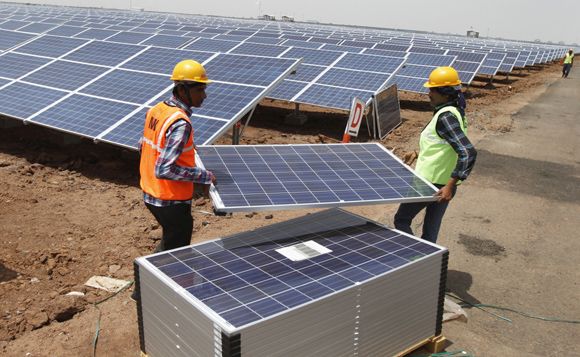
In Mali, Niger, Sierra Leone, India, Indonesia, and Kenya, fuel-based lighting is not particularly 'job-intensive.'
Switching from fuel-based lighting -- such as firewood and kerosene lanterns -- to solar-LED systems also create two million potential new jobs in developing countries like India, a first-of-its-kind study has found.
Lawrence Berkeley National Laboratory (Berkeley Lab) researcher Evan Mills conducted the first global analysis of how the transition to solar-LED (light-emitting diode) lighting will impact employment and job creation.
"People like to talk about making jobs with solar energy, but it's rare that the flip side of the question is asked -- how many people will lose jobs who are selling the fuels that solar will replace?" said Mills.
"The good news is, we found that we will see many more jobs created than we lose," he said.
While there are about 274 million households worldwide that lack access to electricity, the study focuses on about 112 million households, largely in Africa and Asia, that cannot afford even a mini solar home system, which might power a fan, a few lights, a phone charger and a small TV.
In countries such as Mali, Niger, Sierra Leone, India, Indonesia, and Kenya, fuel-based lighting is not particularly 'job-intensive.'
Individual entrepreneurs sell lanterns, wicks, candles, fuel dippers and kerosene in small quantities, often in local markets or on the roadside, but few jobs are created and many are part-time.
Researchers found that fuel-based lighting today provides 150,000 jobs worldwide.
He did a similar analysis for the emerging solar-LED industry and also collected data on employment rates for larger manufacturers and distributors representing the majority of global production of products quality assured by the World Bank's Lighting Global initiative at the time.
He found that every one million of these lanterns provides an estimated 17,000 jobs.
These values include employees of these companies based in developing countries but exclude upstream jobs in primary manufacturing by third parties such as those in factories in China.
Assuming a three-year product life and a target of three lanterns per household, this corresponded to about two million jobs globally, more than compensating for the 150,000 jobs that would be lost in the fuel-based lighting market, researchers said.
They also found that the quality of the jobs would be much improved.
"With fuel-based lighting a lot of these people are involved in the black market and smuggling kerosene over international borders, and child labour is often involved in selling the fuel," Mills said.
"These new solar jobs will be much better jobs -- they're legal, healthy and more stable and regular," he said.
The study was published in the journal Energy for Sustainable Development.
Image: A file photograph of the Gujarat solar park being set up. Photograph: Amit Dave/Reuters



.jpg)





